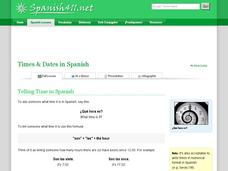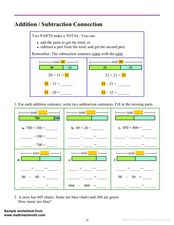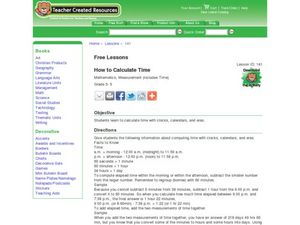Futures Channel
Algebra Magic
Abracadabra! Letters can be used in math to represent numbers with the operations of addition, subtraction, multiplication, and division to solve problems! Math magicians will participate in an activity that uses a calculator and a bag...
Curated OER
Finding Solutions by Working Backwards
In this math worksheet, learners learn to solve word problems by working backwards. Students read the 20 word problems and solve them, choosing the best answer from 4 choices. There are helpful hints on the page to clue learners to work...
Curated OER
Lesson 9-3 Practice A: Composite Figures
In this composite figures worksheet, students solve twelve short answer problems. Students find the area of figures composed of various polygons given a sketch of the figure with side lengths labeled.
Curated OER
Dr. Al Gebra
Young math whizzes role play a doctor operating on a patient without diagnosing the patient's condition. They relate this medical malpractice to performing a mathematical operation before evaluating conditions or deciding what the...
Curated OER
I Dig Dinosaurs
Students examine the process of fossil removal and the naming of dinosaurs. They participate in a "fossil dig" involving cookies, create new dinosaur names, and create a picture of a dinosaur they name.
Curated OER
Times & Dates in Spanish
Use this information, presentation, and infographic to build several lessons on telling the time and expressing the date in Spanish. The information is broken into topics and includes many examples and exceptions to the standard rules....
Virginia Department of Education
Exponents and Radicals
What is that fraction doing as an exponent? Fun math games prompt learners to practice evaluating radical expressions and expressions containing rational exponents, both in groups and individually.
Pennsylvania Department of Education
What Balances?
Students explore another meaning of subtraction as it pertains to the inverse of addition. In this what balances activity, students identify the concept of subtraction as a balance. Students use subtraction facts to generate addition...
Curated OER
Mass-Mass Relationship
Students investigate mass-mass relationships in the lab. In this mass-mass relationship lesson plan, students mix sodium carbonate with hydrochloric acid to produce sodium chloride, water and carbon dioxide. Students use the amount of...
Curated OER
Estimate and Compare Data
Seventh graders explore the values that are used in order to describe data that is collected or given. They compare data using the statistical analysis provided by finding the mean, median, and range.
West Contra Costa Unified School District
Connecting Fractions and Rational Expressions
Teach class members to work with rational expressions using their knowledge of fractions. The lesson plan starts with a warm-up of rational expressions at four different levels of complexity. The different levels continue throughout...
Curated OER
Mass-Mass Relationships
Students investigate mass-mass relationships using potassium carbonate and hydrochloric acid. In this mass-mass relationship lesson plan, students measure a certain amount of potassium carbonate and determine how much hydrochloric acid...
EngageNY
Using Matrix Operations for Encryption
Data encryption is an important security measure for sensitive data stored on computers. Pupils learn how to utilize matrices for creating code. They also get a great review of matrix multiplication, inverse matrices, and the identity...
Curated OER
Calculate the Slope of a Line Using Two Points
Find that slope! This video does an excellent job of demonstrating how to use the slope formula to find the slope of a line using two points. The instructor first reviews the definition of slope of a line, then works three problems using...
Pennsylvania Department of Education
Links Away: Looking Back and Moving Forward
Students explore fact families. In this math lesson, students use links to model a fact family. Students solve addition and subtraction problems.
Curated OER
Mathematical Properties for Addition
In this math worksheet, students read about and learn the properties of addition. Students study the commutative, associative, identity and inverse properties. There are no problems on this page for students to solve.
Curated OER
Counting and Calculating
In this math worksheet, students follow the basic activities that are shown in the planning guide written for the teacher. The plan is written in the form of a unit.
Curated OER
Checking Subtraction with Addition and Writing Number Sentences
In this math worksheet, students complete 12 subtraction problems which they check with addition. They solve 6 short mixed word problems and write a number sentence for each while solving it.
Curated OER
Magic Tricks with Numbers
For this magic tricks with numbers worksheet, students learn three tricks involving addition, subtraction, multiplication and division of simple numbers as a magic trick.
Curated OER
Addition / Subtraction Connection
In this addition and subtraction learning exercise, students write addition and subtraction number sentences that relate to each other and solve word problems. Students complete 6 sets of problems.
Curated OER
Counting More and Counting Less
In this counting more and counting less worksheet, 1st graders count the objects in each group, write the numeral, and for six problems circle the group that has more, for the next six problems, circle the group that has less.
Curated OER
How to Calculate Time
Students complete a worksheet. In this calculations lesson, students learn factual information about computing time with clocks, calendars and eras. Students show their knowledge by completing a worksheet.
Curated OER
Carrying to Tens
in this addition worksheet, students read about carrying tens, then complete 13 problems, circling cubes as directed and solving. A website reference is given for additional activities.
Curated OER
Addition, Subtraction, and More Multiplication with Radicals: Extra Practice 36
In this math worksheet, young scholars use the distributive property to complete computation with radicals. Students multiply pairs of binomials that have the square root sign in each pair.























